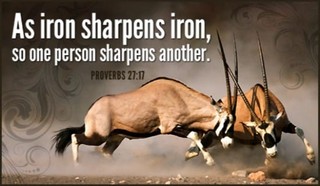- Recent Translations
- All Translations
Proverbi 27
Share
Settings
Proverbi 27 Commentary
Chapter 27
Verse 1 We know not what a day may bring forth. This does not forbid preparing for to-morrow, but presuming upon to-morrow. We must not put off the great work of conversion, that one thing needful. Verse 2 . There may be occasion for us to justify ourselves, ( proverbs 27:3-4 ) ( proverbs 27:5-6 ) rebukes are better, not only than secret hatred, but than love which compliments in sin, to the hurt of the soul. Verse 7 . The poor have a better relish of their enjoyments, and are often more thankful for them, than the rich. In like manner the proud and self-sufficient disdain the gospel; but those who hunger and thirst after righteousness, find comfort from the meanest book or sermon that testifies of Christ Jesus. Verse 8 . Every man has his proper place in society, where he may be safe and comfortable. ( proverbs 27:9-10 ) kindred's sake; apply to those who are at hand, and will help in need. But there is a Friend that sticketh closer than a brother, and let us place entire confidence in him. Verse 11 . An affectionate parent urges his son to prudent conduct that should gladden his heart. The good conduct of Christians is the best answer to all who find fault with the gospel. Verse 12 . Where there is temptation, if we thrust ourselves into it, there will be sin, and punishment will follow. Verse 13 . An honest man may be made a beggar, but he is not honest that makes himself one. Verse 14 . It is folly to be fond of being praised; it is a temptation to pride. ( proverbs 27:15-16 ) shower, troublesome for a time; the contentions of a wife are like constant rain. Verse 17 . We are cautioned to take heed whom we converse with. And directed to have in view, in conversation, to make one another wiser and better. Verse 18 . Though a calling be laborious and despised, yet those who keep to it, will find there is something to be got by it. God is a Master who has engaged to honour those who serve him faithfully. Verse 19 . One corrupt heart is like another; so are sanctified hearts: the former bear the same image of the earthly, the latter the same image of the heavenly. Let us carefully watch our own hearts, comparing them with the word of God. Verse 20 . Two things are here said to be never satisfied, death and sin. The appetites of the carnal mind for profit or pleasure are always desiring more. Those whose eyes are ever toward the Lord, are satisfied in him, and shall for ever be so. Verse 21 . Silver and gold are tried by putting them into the furnace and fining-pot; so is a man tried by praising him. Verse 22 . Some are so bad, that even severe methods do not answer the end; what remains but that they should be rejected? The new-creating power of God's grace alone is able to make a change. ( 23-27 ) . We ought to have some business to do in this world, and not to live in idleness, and not to meddle with what we do not understand. We must be diligent and take pains. Let us do what we can, still the world cannot be secured to us, therefore we must choose a more lasting portion; but by the blessing of God upon our honest labours, we may expect to enjoy as much of earthly blessings as is good for us.
Proverbi 27 Commentaries
Chapter Summary
INTRODUCTION TO 1 KINGS 14
This chapter relates the sickness of Jeroboam's son, the application of his wife, at his instance, to the prophet Ahijah, in the child's favour, 1Ki 14:1-6, the prophecy of the prophet concerning the ruin of Jeroboam's house, and the death of the child, which came to pass, 1Ki 14:7-18, an account of the years of Jeroboam's reign, and also of Rehoboam's, 1Ki 14:19-21, and of the evil things done and suffered by the latter in his kingdom, and the calamities that came upon him for it, 1Ki 14:22-28 and the conclusion of his reign, 1Ki 14:29-31.

